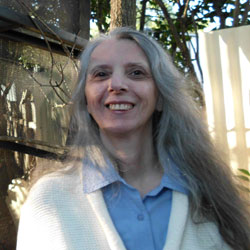Eleanor Roosevelt woke up in Paris. Hillary
Clinton wore an autumn jacket, bright
beads, and addressed the Press about
the new Libyan No Fly Zone. Hillary’s
campaign faux pearls – as big and
innocent as Jackie Kennedy’s – were gone:
replaced by those semi-precious beads
in elegant earth colours, just
as Eleanor would have worn
herself. Hillary, however, did not
mention that this day in Bahrain
fifty demonstrators were shot, the Saudi
Army had moved in to savagely protect
the Government, with the glowing
Pearl Roundabout monument destroyed
because the protestors had employed
it as a gathering symbol. Eleanor
remembered the thirty-year-old statue
as being indeed quite as lovely
as a star turn at the jewellers,
the giant luna pearl enclasped
high up in petal-claws. Maybe
because she was old, she thought,
she increasingly loved the pretty.
Hillary was actually
even prettier each day, but
the best she could attempt on Bahrain
was to recommend social order, the sacred
schoolday, workday. Eleanor had been
to school in France two centuries ago, the
headmistress a very nice American
Lesbian whose name she forgot, but
she did recall reading the Medieval
poem ‘Pearl’ on the pearl maiden lost
by her father as a child, reappearing as
an angelic young woman reproaching him
for not being a ‘gentle jeweller’, since
he mourned her inconsolably. We also,
Eleanor reflected, continue to grow
after death. Hillary at one point scratched
her head and visibly thought this would not
look so good and stopped. She often
scratched it absently, luxuriantly, as
women do, when she discussed her plans
with Eleanor. She could do anything in front
of her, she smiled with sugar, pretended it
was to the Press (some of whom suddenly
looked puzzled at her delicious fondness),
told all who were staying to enjoy
their night in Paris teasingly, then left.
Her cute march out of the room, smile
were as self-consciously naughty as a moppet
in the movies, so relaxed
because Eleanor was there. As soon
as they were in the hotel room, she knew
as useful as the Seine, she’d hear
‘But, now, about Bahrain, my dear …’
and thankfully it would not let her be.
Notes on the Poem
Is there a word for the intriguing and lively feature that Jennifer Maiden uses to telling effect in "Hillary and Eleanor 9: The Pearl Roundabout" and other selections from here 2013 Griffin Poetry Prize shortlisted work "Liquid Nitrogen"? If there isn't a word or label for the feature, she inspires us to invent one. Maiden brings together two powerful figures - US politicians and former first ladies Eleanor Roosevelt and Hillary Clinton - to discuss a particularly fraught political situation symbolized by a pearl. There is resonance and potency in an imagined meeting between public figures from different historical periods. (Eleanor Roosevelt died when Hillary Rodham would have been 15 years old, so it's possible they could have met, but didn't. Still, Hillary Clinton has referenced and invoked Roosevelt in recent years.) Maiden not only brings together strong figures speaking across the divide of time to bring her themes of global politics to life (as acknowledged in the judges' citation for "Liquid Nitrogen"), but she explores the many-dimensioned symbol and suggestions of the pearl. The perhaps intentionally trite observation "Hillary was actually even prettier each day" calls to mind that a string of pearls has been demure ornamentation for women, including the female partners of politicians and world leaders, for many generations. That both Roosevelt and Clinton transcended that role couples forcefully with learning more (as Maiden compels us to do with this and other of her intensely considered poems) about the Pearl Roundabout, which became an emblem of protest. In lieu of a word or phrase to capture the concept of historical figures reaching across time to confer, thank you to Frances Hennessey for suggesting Sosibios. The sculptor of the Pentelic marble vase that inspired John Keats' "Ode on a Grecian Urn" captured figures frozen in time who might well have wanted to confabulate as Maiden's Roosevelt and Clinton do.
